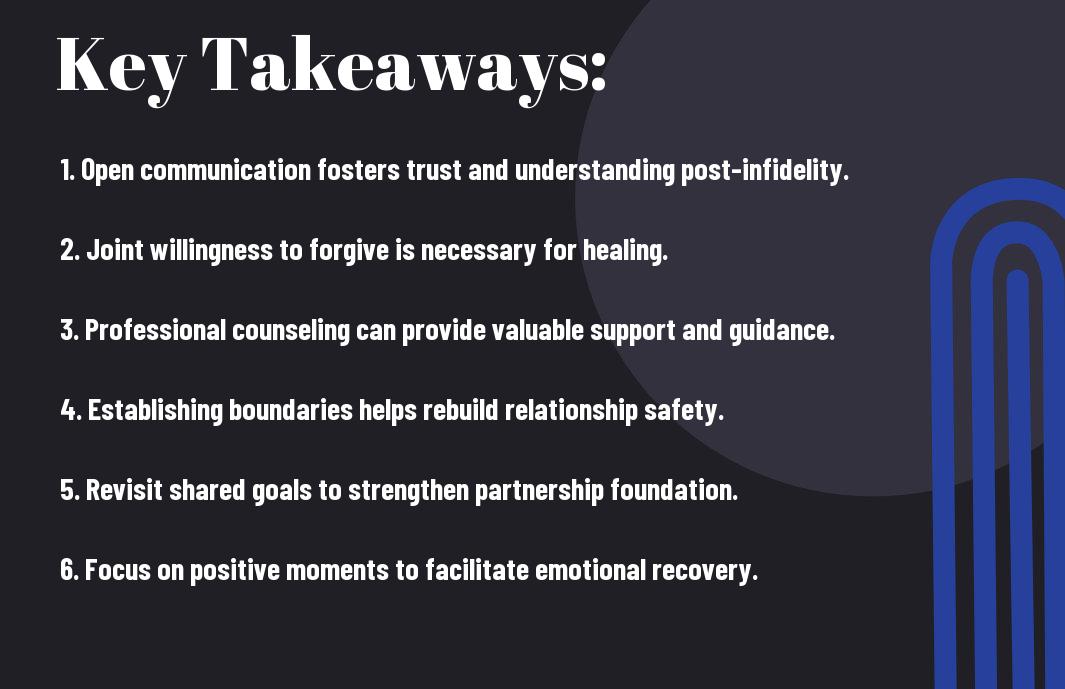You may be feeling lost after experiencing infidelity in your marriage, but there is hope for healing and growth. Recognizing key signs that your relationship can survive this devastating betrayal is necessary. With open communication and a willingness to work through pain, you and your partner can rediscover your connection. In this post, you’ll learn about the positive indicators of resilience in your marriage and actionable steps to initiate the healing process, paving the way toward forgiveness and a stronger partnership.

Key Takeaways:
- Open communication is vital; both partners must express their feelings and thoughts honestly to rebuild trust.
- Recognizing the underlying issues that led to infidelity can help in understanding each other’s needs and desires.
- Seeking professional help, such as couples therapy, can provide guidance and support during the healing process.
- Establishing boundaries and agreements can create a safer environment for both partners to rebuild their relationship.
- Taking time to process emotions is important; healing is a gradual journey that requires patience from both parties.
- Being willing to forgive and move forward is vital for restoring intimacy and connection in the marriage.
- Reassessing and revitalizing shared goals and values can strengthen the partnership and create a renewed sense of purpose.

Understanding Infidelity
Your journey towards healing begins with a deep understanding of infidelity. This often complicated emotional landscape can vary greatly between couples, making it imperative for you to recognize what infidelity truly means in the context of your relationship. Unpacking the nuances of betrayal will set the foundation for rebuilding trust and moving forward.
Defining Infidelity
The term infidelity encompasses a range of behaviors that violate the expectations of fidelity within a relationship. While most commonly associated with sexual affairs, emotional infidelity can also play a significant role in the betrayal experience, making it important for you to acknowledge how both types can impact your relationship.
Common Reasons for Infidelity
Across relationships, infidelity can stem from various motivations, often rooted in unmet needs or dissatisfaction. Factors such as emotional disconnection, lack of intimacy, and a desire for adventure can lead individuals to stray. Understanding these underlying issues is imperative to address the root causes of the betrayal in your marriage.
Another factor influencing infidelity is environmental stressors, like work pressures or major life changes, which can leave you feeling disconnected and desperate for validation. Additionally, individual insecurities may lead you or your partner to seek solace outside the marriage. Engaging in open communication about personal needs and desires can help you uncover motivations behind infidelity, paving the way for understanding and healing in your relationship.

Signs of a Resilient Marriage
It is important to recognize the signs of a resilient marriage, especially after facing the challenges of infidelity. If your relationship demonstrates strong communication, trust, and a willingness to engage in mutual understanding, these are indicators that your marriage has the potential to survive. Moreover, prioritizing healing, connection, and shared goals can further strengthen your bond, offering a foundation to rebuild your relationship.
Open Communication
An open line of communication is necessary when navigating the aftermath of infidelity. When you and your partner can share your feelings, fears, and expectations freely, you create an environment of honesty that fosters healing. Working together to talk about the issues at hand demonstrates a willingness to mend the relationship, making it easier to tackle the underlying problems contributing to the infidelity.
Emotional Connection
Connection is fundamental in a resilient marriage, especially when recovering from betrayal. Re-establishing your emotional bond involves vulnerability and trust, allowing you both to share your innermost thoughts and feelings. This process helps in rebuilding the sense of intimacy that may have been lost. By committing to understanding each other’s emotional needs and supporting one another, you pave the way for healing and growth. Prioritizing this connection will help you both navigate the complexities of your relationship moving forward.
Due to the profound impact of emotional disconnection during infidelity, addressing this aspect is vital for healing. When you actively engage in rebuilding your emotional bond, you open doors to new levels of understanding and comfort. It’s necessary to express vulnerability while also practicing empathy toward your partner’s hurt. This dual effort not only strengthens your relationship but it also fosters a deeper level of trust. When you invest time and energy into this emotional reconnection, it becomes easier to overcome the challenges ahead and envision a brighter future together.
The Healing Process
Keep in mind that healing after infidelity is a journey, not a destination. It requires patience, effort, and commitment from both partners. You will likely experience a rollercoaster of emotions, but addressing these feelings head-on is the first step towards rebuilding trust and intimacy. Mutual support and open communication are key components in restoring the bond between you and your partner as you navigate this process together.
Acknowledgment of Pain
Among the first steps in healing is acknowledging the pain both you and your partner are experiencing. It’s vital to process your emotions and validate each other’s feelings. This can often be the most difficult part, but facing the hurt together helps to establish a foundation for recovery. Make space for open discussions about the impact of infidelity and give yourself time to feel and express your pain.
Seeking Professional Help
After recognizing the emotional turmoil, seeking professional help can significantly aid your healing process. Therapists can provide a safe space for both of you to express thoughts and emotions that may be difficult to share otherwise. Qualified guidance offers tools to improve communication and manage conflict, helping you navigate the unpredictability of your relationship post-infidelity.
Even if you feel overwhelmed, engaging with a therapist can help pinpoint underlying issues that contributed to the infidelity. A professional can also facilitate constructive conversations between you and your partner. This safe environment helps you express your feelings without judgment, and learning effective coping strategies is vital to move forward. Bear in mind, seeking help isn’t a sign of weakness; rather, it’s a proactive step toward healing and rebuilding your relationship stronger than before.
Rebuilding Trust
Now that the initial shock of infidelity has begun to subside, the journey toward rebuilding trust is crucial for the survival of your marriage. This process requires a commitment from both partners to communicate openly and engage in the necessary healing practices to reinforce your relationship. By addressing the underlying issues that led to infidelity, you can create a solid foundation for regaining trust and intimacy.
Transparency and Honesty
Against the odds, transparency and honesty become your allies in rebuilding trust. Each partner must express their feelings, fears, and expectations candidly to create an atmosphere where both of you feel safe and respected. Establishing this level of communication will be critical for navigating the emotional complexities that arise during the healing process.
Establishing New Boundaries
Honesty is vital when it comes to establishing new boundaries that reflect your renewed commitment to each other. These boundaries should be collaboratively created, ensuring both partners feel heard and valued. Discuss what is acceptable in your relationship moving forward, whether it’s about interactions with others or sharing personal space. Emphasizing these boundaries will help restore a sense of security and mutual respect.
Due to the emotional turbulence that follows infidelity, setting clear and defined boundaries is instrumental in fostering trust. You must address potential triggers and temptations, openly discussing any concerns about previous behaviors that led to infidelity. Establishing these new expectations helps mitigate misunderstandings and reinforces a shared vision for your relationship. By prioritizing each other’s feelings, you not only honor your commitment but also create a safe environment for healing and growth.
Strengthening Your Relationship
To rebuild your marriage after infidelity, focus on strengthening the connection you share. Work towards establishing open communication, trust, and understanding while contemplating your future. If you’re unsure about the path forward, explore 11 Signs to Understand When to Walk Away After Infidelity to guide your decision-making process.
Prioritizing Quality Time
The key to healing is making time for each other amidst daily responsibilities. Set aside dedicated moments where you can talk, reflect, and reconnect without distractions. This intentional effort will gradually rebuild intimacy and trust.
Engaging in Joint Activities
After prioritizing quality time, take the next step to engage in activities together that foster bonding. Exploring new hobbies, going on dates, or seeking adventures can enhance your emotional connection and create positive experiences.
Understanding how to incorporate joint activities into your routine can play a vital role in your recovery process. These shared experiences allow you to forge new memories and build a sense of teamwork. Whether it’s learning to cook together or going on outdoor adventures, engaging in mutual interests encourages open dialogue about your feelings and challenges. Embracing these moments not only helps in rebuilding trust but also allows you to rediscover the joy in your relationship.
Moving Forward Together
Many couples find that overcoming infidelity can actually strengthen their relationship. By acknowledging the pain and working together, you have the opportunity to rebuild trust and create a renewed sense of intimacy. It’s imperative for both partners to communicate openly and honestly, fostering an environment where healing can thrive. By focusing on your shared goals, you can cultivate a stronger bond as you navigate this difficult chapter together.
Setting Future Goals
By defining clear, shared goals, you and your partner can create a roadmap for your future. Discuss what you both want from your relationship moving forward, whether it’s improving communication, spending more quality time together, or exploring new interests as a couple. Having these mutual goals can provide direction and purpose in your journey toward healing.
Maintaining Long-Term Commitment
Together, it’s imperative to prioritize and invest in your relationship after infidelity. Establishing a routine of regular check-ins can help ensure you’re both on the same page emotionally and physically. Engaging in activities that strengthen your bond can also reinforce your commitment to one another. By openly discussing your feelings and addressing challenges together, you will actively demonstrate your dedication to sustaining a healthy relationship.
Also, maintaining long-term commitment demands patience and continuous efforts from both partners. Stay aware of each other’s emotional needs and make it a priority to express love and appreciation regularly. Acknowledge the challenges you’ve overcome and celebrate your relationship milestones. Building trust and security takes time, so focus on nurturing your connection through positive actions and responsible communication. By doing so, you empower each other to grow stronger together, turning a painful experience into an opportunity for lasting love.
To wrap up
As a reminder, your marriage can emerge stronger after infidelity if both partners are willing to commit to healing together. Recognizing the signs that your relationship can survive this challenge—such as open communication, mutual effort, and a shared desire to rebuild trust—is important. Start the healing process by fostering honest conversations, seeking professional guidance, and understanding each other’s feelings. Embrace vulnerability, and prioritize rebuilding intimacy, as these steps will guide you toward a healthier, more resilient partnership moving forward.
FAQ
Q: What are some signs that indicate my marriage can survive infidelity?
A: There are several signs that suggest your marriage might withstand the effects of infidelity. If both partners exhibit a willingness to communicate openly and honestly about feelings, it’s a positive sign. Additionally, if both individuals express remorse and a desire for change, it indicates commitment to the relationship. Seeking professional help, such as couples therapy, shows a dedication to healing. When both partners are invested in rekindling trust and intimacy, it signals that recovery is possible. Lastly, if there is a strong history of love and support, it can be a foundation upon which to rebuild.
Q: How can I start the healing process after infidelity?
A: Starting the healing process after infidelity requires a thoughtful approach. First, allow both partners to express their feelings and grievances without interruption, fostering an environment of open dialogue. Next, consider engaging a professional therapist who specializes in relationship issues. Establishing boundaries around communication and behavior can help in rebuilding trust. It’s crucial to practice patience, as healing takes time. Incorporating activities that rekindle emotional and physical intimacy can facilitate connection. Lastly, be attentive to each other’s needs and check in regularly on the progress of the relationship.
Q: What role does communication play in recovering from infidelity?
A: Communication plays a vital role in recovering from infidelity. It helps both partners articulate their feelings, needs, and expectations, fostering understanding and empathy. Open dialogues can uncover underlying issues that may have led to the infidelity and allow for resolution. It’s important to maintain a non-judgmental approach, encouraging honesty about emotions, whether they are anger, sadness, or confusion. Sharing thoughts freely can also aid in rebuilding trust, as transparency demonstrates commitment to the healing process. Regular check-ins about each other’s feelings can also reinforce connection and support emotional healing.
Q: Can trust be rebuilt after infidelity, and how?
A: Yes, trust can be rebuilt after infidelity, although it is a gradual process that requires effort from both partners. Transparency is crucial; the unfaithful partner should willingly share information and be open about their actions moving forward. Consistent behavior changes, such as being reliable and keeping promises, help rebuild faith in the relationship. Engaging in activities that promote bonding and bonding time, such as regular dates or exploring shared interests, can strengthen the partnership. Both partners should also express gratitude for progress made and celebrate small victories to reinforce the positive changes in their relationship.
Q: What are common challenges couples face when trying to heal from infidelity?
A: Couples often encounter various challenges while healing from infidelity. Deep-seated emotions such as anger, betrayal, and guilt can surface and impede progress. Additionally, uneven commitment levels—where one partner may want to move on quicker than the other—can create friction. Past unresolved issues may resurface, complicating the recovery process. There may also be external stressors, such as family pressures or financial worries, that divert attention from healing. It’s important for both partners to acknowledge these challenges and work together to address them, perhaps with guidance from a professional, to stay focused on their relationship’s recovery.
